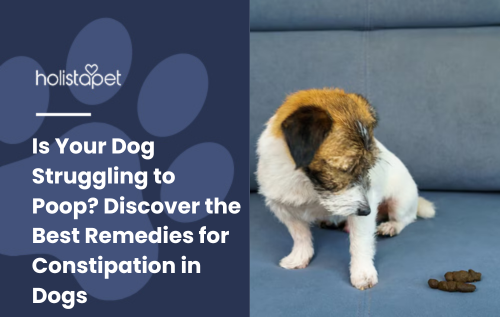Just like humans, dogs can suffer from constipation — and when they do, it can be uncomfortable, even painful. If your furry friend is straining during bathroom breaks or hasn’t pooped in over 48 hours, it's time to take action. In this article, we’ll walk you through effective constipation remedies for dogs, from quick at-home solutions to when you should call the vet.
What Causes Constipation in Dogs?
Before diving into remedies, it helps to understand the common causes of dog constipation:
-
Dehydration
-
Lack of dietary fiber
-
Ingesting non-food items (bones, hair, toys)
-
Lack of exercise
-
Side effects from medication
-
Age-related issues or underlying medical conditions
Identifying the root cause helps determine the most appropriate treatment.
Safe and Effective Constipation Remedies for Dogs
Here are some tried-and-true remedies you can consider:
1. Increase Fiber Intake
Adding fiber to your dog’s diet can get things moving. Consider:
-
Canned pumpkin (plain, not pie filling)
-
Cooked sweet potatoes
-
Bran cereal (in moderation)
Start with a teaspoon for small dogs or a tablespoon for larger dogs, once daily.
2. Ensure Proper Hydration
Make sure your dog has access to clean, fresh water at all times. Wet dog food can also increase fluid intake.
3. Olive or Coconut Oil
Adding a small amount (1/2 to 1 teaspoon for small dogs, up to 1 tablespoon for larger dogs) of olive or coconut oil to food can help lubricate the digestive tract.
4. Gentle Exercise
Regular walks and play sessions can stimulate your dog’s digestive system and promote bowel movements.
5. Over-the-Counter Remedies (With Vet Approval)
Some dog-safe stool softeners or laxatives may be recommended by your vet, such as lactulose or Miralax (polyethylene glycol). Never use human medications without veterinary guidance.
6. Probiotics
A daily probiotic supplement can promote gut health and prevent future constipation episodes.
7. Massage
Gently massaging your dog’s belly in a circular motion can encourage peristalsis (intestinal movement).
When to See the Vet
If your dog:
-
Hasn’t pooped in more than 48–72 hours
-
Is vomiting, lethargic, or showing signs of pain
-
Has blood in their stool
-
Strains but produces no stool
…seek veterinary care immediately. These can be signs of a blockage or other serious condition like megacolon.
Frequently Asked Questions
How can I tell if my dog is constipated?
Look for signs such as straining without producing stool, dry or hard stools, decreased appetite, or lethargy.
Is milk a safe remedy for dog constipation?
While some pet owners use milk as a laxative, it can cause diarrhea and is not recommended unless advised by a vet.
Can I give my dog human laxatives?
No. Many human laxatives are toxic to dogs and can lead to serious complications.
How long does it take for pumpkin to help with constipation?
Pumpkin usually works within 12–24 hours, but results can vary depending on the severity of the constipation.
Final Thoughts
Constipation in dogs is not uncommon, but with the right approach — from boosting hydration and fiber to vet-approved remedies — you can provide your dog quick and lasting relief. Always monitor your pup’s bathroom habits, and when in doubt, consult a veterinarian.
🦴🐾 A happy gut means a happier tail-wagging companion!




 CBD Oil for Dogs - Fast Acting
CBD Oil for Dogs - Fast Acting
 Chicken Flavored CBD Oil For Dogs - Easy Dose
Chicken Flavored CBD Oil For Dogs - Easy Dose
 Salmon Flavored CBD Oil For Dogs - Highly Rated
Salmon Flavored CBD Oil For Dogs - Highly Rated
 CBG Oil for Dogs and Cats - Loved by Thousands
CBG Oil for Dogs and Cats - Loved by Thousands





Leave a comment
This site is protected by hCaptcha and the hCaptcha Privacy Policy and Terms of Service apply.